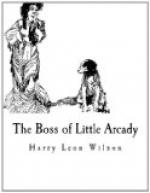“But what did he do?”
“Well, I got a clew to another past of his—”
“What is it? Let’s have it!”
Billy was still not to be driven faster than a detective story should move.
We heard, and dimly saw, him engaged with a metallic object which he drew from under his coat. We were silent. Then we heard him say:—
“My lamp’s went out—darn these matches!”
At last he seemed to light something. He unfolded a bit of paper before us and triumphantly across its surface he directed the rays of a bull’s-eye lantern. This was his climax. We studied the paper.
“Billy,” said Solon, after a pause, “this looks like a good night’s work. True, it may come to naught. We may still be baffled, foiled, thwarted at every turn—and yet something tells me that the man is in our power—that by this precious paper we may yet bring the scoundrel to his knees in prayers for our mercy, craven with fear at our knowledge.”
“Say,” said Billy, stung to admiration by this flow of the right sort of talk, “Mr. Denney, did you ever read ’Little Rosebud, or is Beauty a Curse to a Poor Girl?’ That sounded just like the detective in that—you remember—where he’s talkin’ to Clarence Armytage just after he’s overheard the old lawyer tell Mark Vinton, the villain, ’If this child lives, you are a beggar!’ Remember that?”
“Why, no, Billy. I must get that, first thing in the morning. My tribute to your professional skill was wholly spontaneous, though perhaps a shade influenced by having listened to your own graphic style. But come, men! Let us separate and be off, ere we are discovered. And mind, not a word of this. One false step might ruin all! So have a care.”
It must have been one of the few perfect moments in the life of Billy.
“You may rely upon William Durgin to the bitter end,” said he, with a quiet dignity. “But there is work yet ahead for me to-night.
“I got to regain my hotel unobserved. My life is not safe a moment with my every step dogged by the hired assassins of that infamous scoundrel.”
“If death or disaster come to you, Billy, you shall not be unavenged. We swear it here on this spot. Swear, Cal!”
“Say,” Billy called back to us, after adjusting his beard, “if anything comes of this,—rewards or anything,—first thing I’m goin’ a’ do—git me a good forty-four Colts. You can’t stop a man with this here little twenty-two, an’ it’s only a one-shot at that. I’d be in a nice hole sometime, wouldn’t I, with my back up against a wall an’ six or seven of ‘em comin’ for me an’ nothin’ but this in my jeans?”
“Point that the other way, Billy—we’ll see about a bigger one later. We can’t do anything to-night. And sell your life as dearly as possible if you have to sell it.”
I fell asleep that night on a conviction that our taste for barren reality is our chief error. If we could only believe forever, what a good world it could be—“a world of fine fabling,” indeed! Also I wondered what J. Rodney Potts might have to apprehend from the leaven of fact in the fabling of Billy Durgin.




